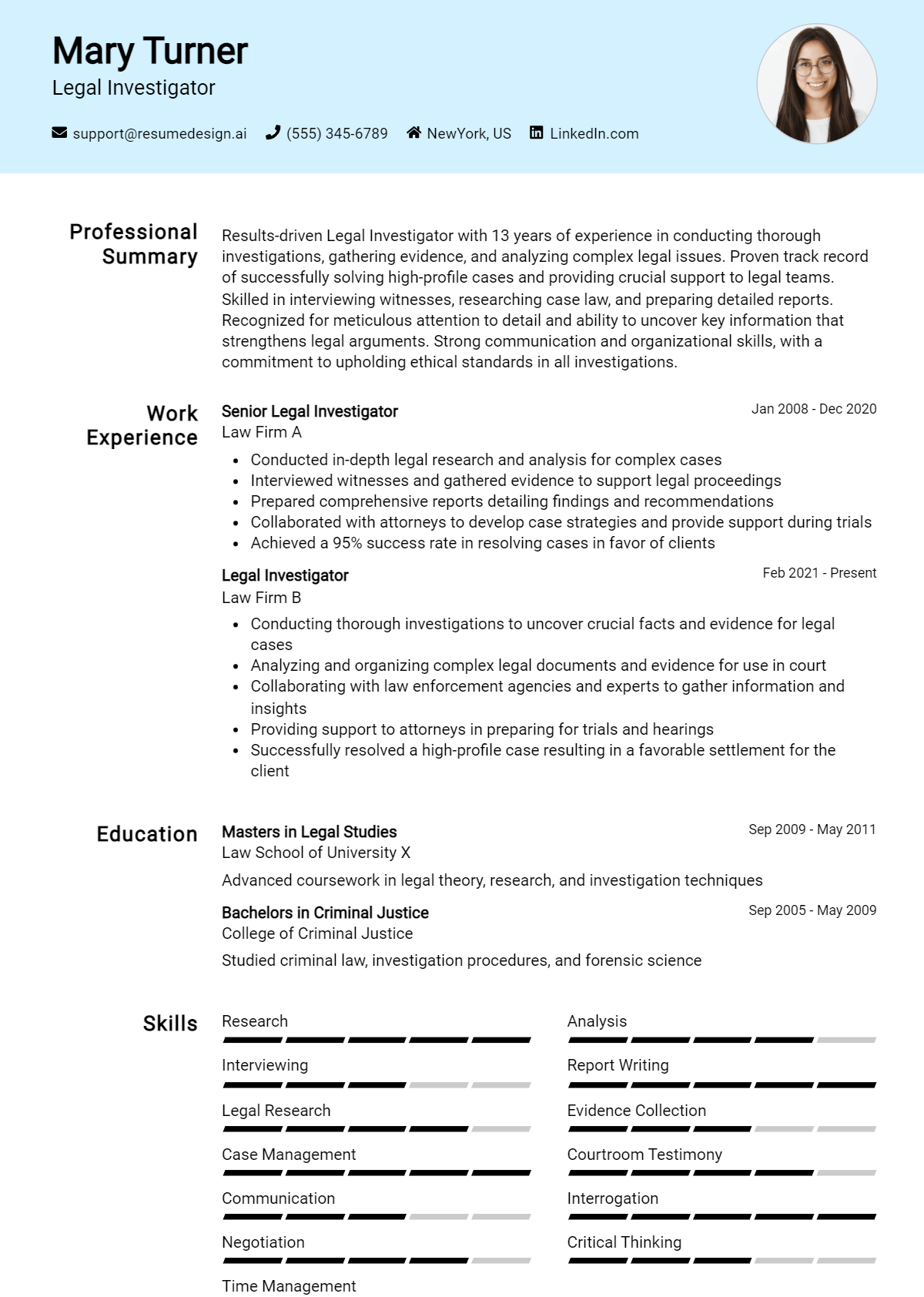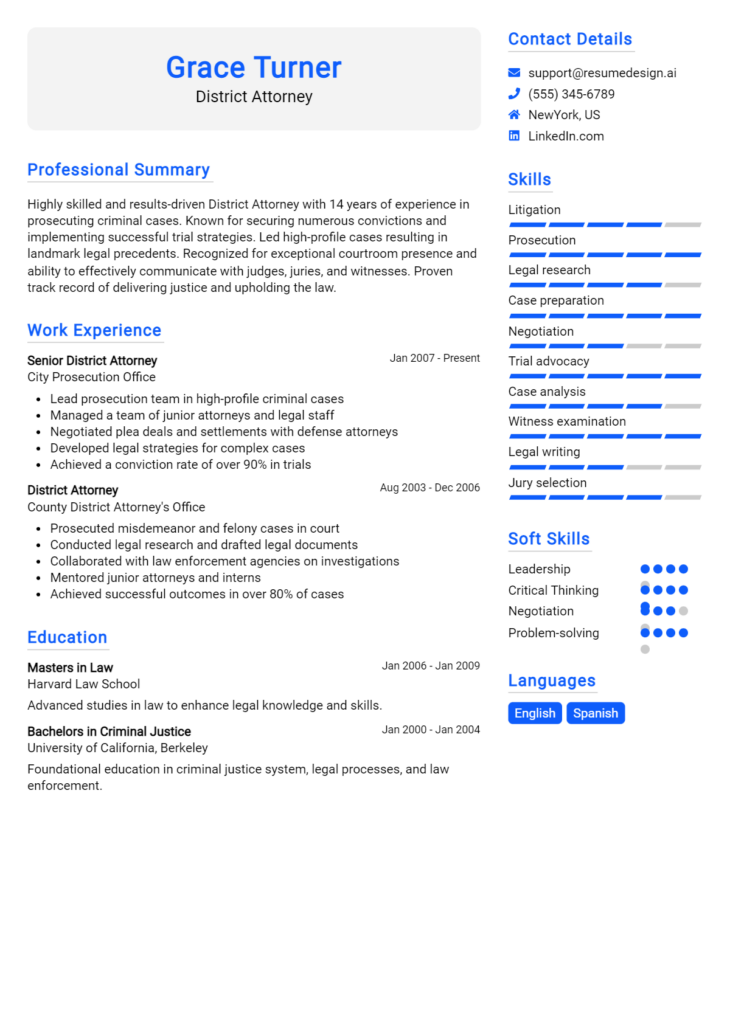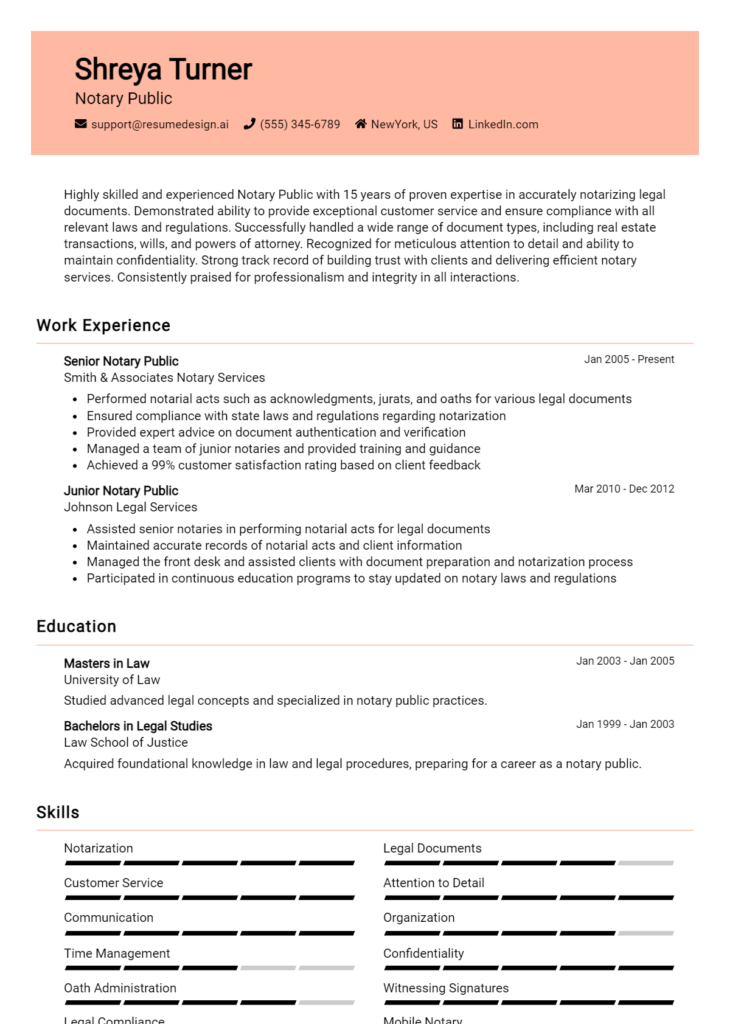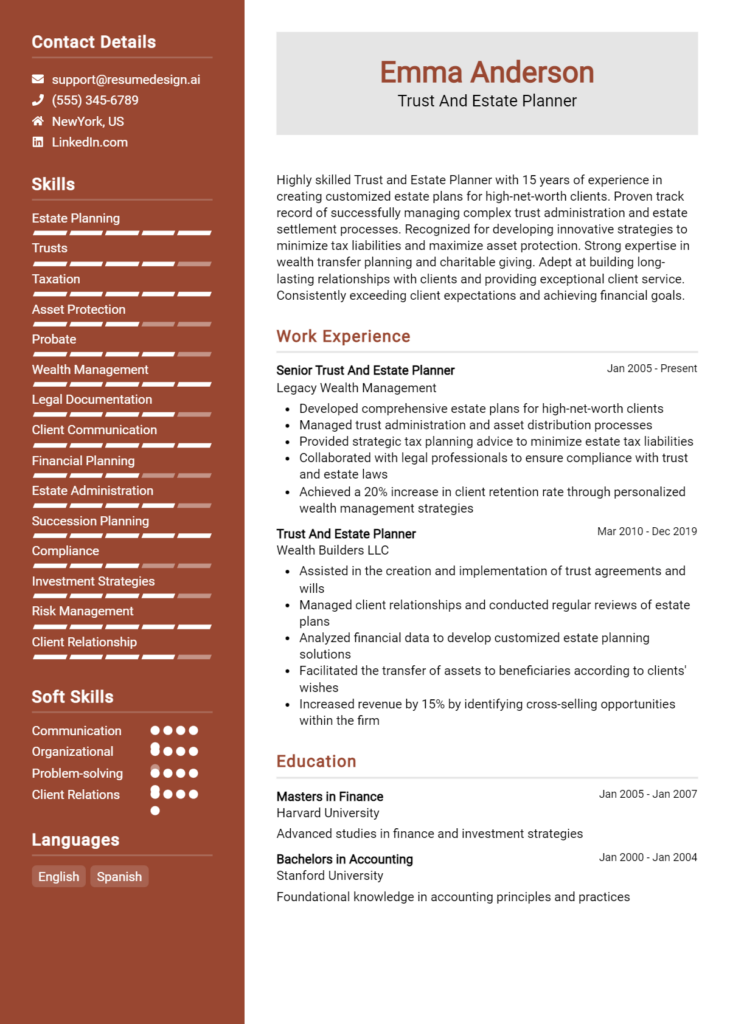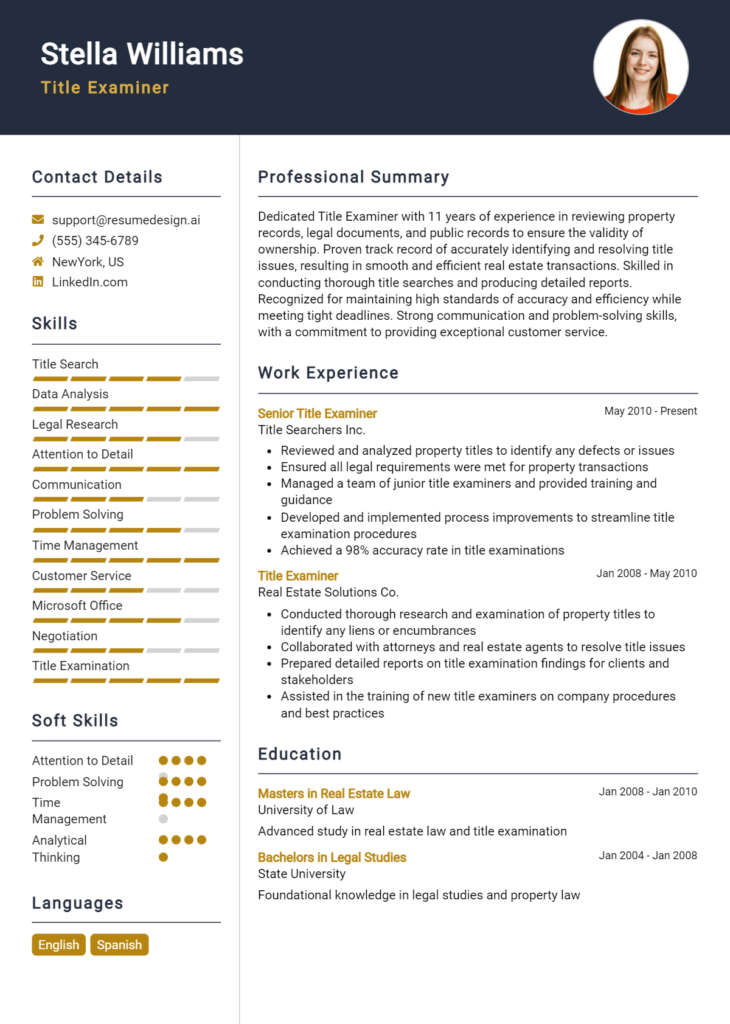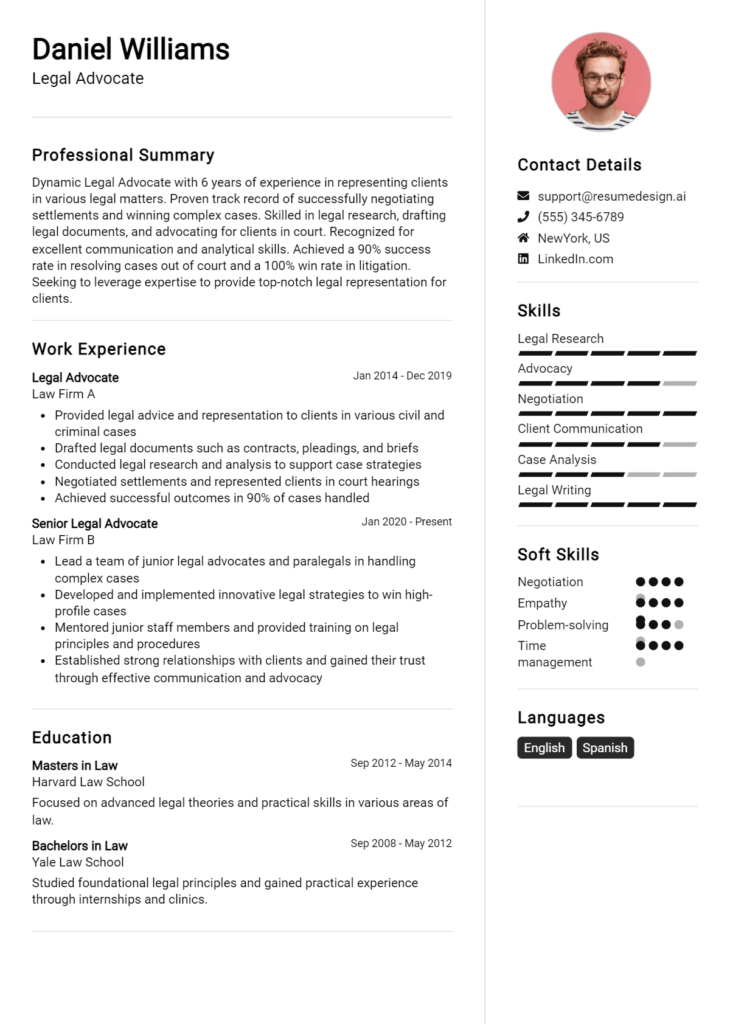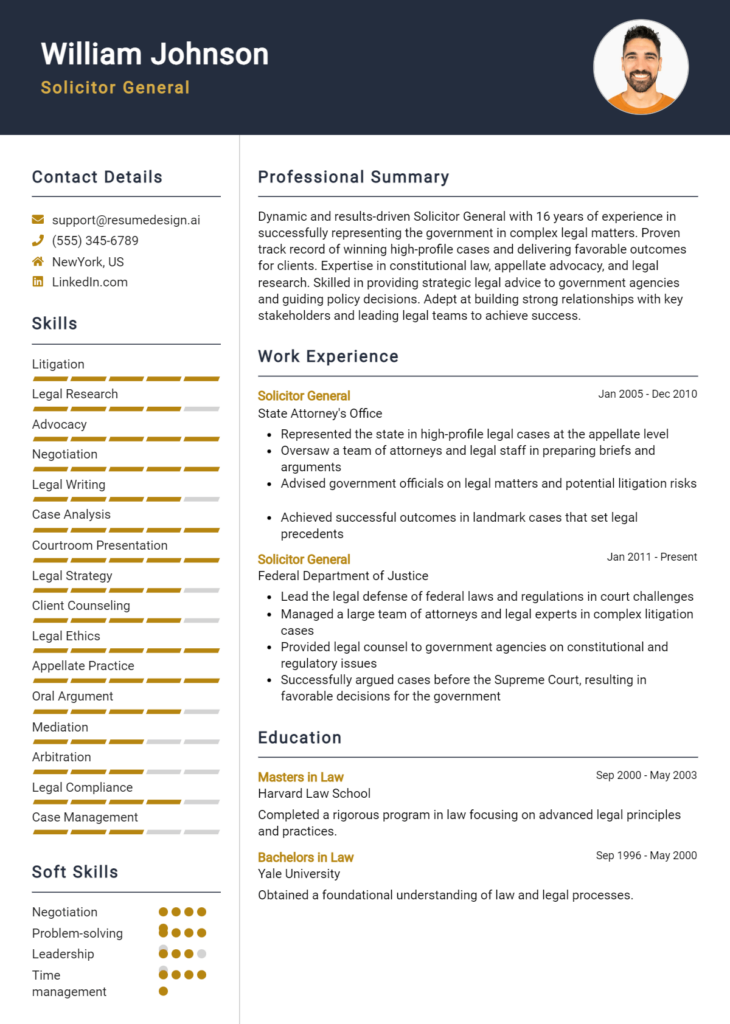Legal Investigator Core Responsibilities
A Legal Investigator plays a crucial role in gathering and analyzing evidence to support legal cases, requiring strong technical, operational, and problem-solving skills. They bridge various departments, collaborating with attorneys, law enforcement, and clients to ensure thorough investigations. These professionals must possess keen analytical abilities, attention to detail, and effective communication skills to contribute to the organization's legal objectives. A well-structured resume effectively showcases these qualifications, highlighting how they drive successful outcomes in complex legal matters.
Common Responsibilities Listed on Legal Investigator Resume
- Conduct thorough background investigations and research.
- Gather and analyze evidence related to legal cases.
- Interview witnesses and clients to obtain relevant information.
- Compile detailed investigative reports for legal teams.
- Collaborate with law enforcement and other agencies.
- Maintain organized case files and documentation.
- Assist in trial preparation and strategy development.
- Utilize technology and databases for information retrieval.
- Ensure compliance with legal regulations and standards.
- Testify in court as needed to present findings.
- Manage timelines and deadlines for investigations.
- Stay updated on legal trends and investigative techniques.
High-Level Resume Tips for Legal Investigator Professionals
In the competitive field of legal investigations, a well-crafted resume is crucial for making a strong first impression on potential employers. Your resume serves as a snapshot of your qualifications, skills, and achievements, and it is often the first opportunity to demonstrate your suitability for the role. For Legal Investigator professionals, it’s essential that your resume not only highlights your investigative abilities but also reflects your understanding of legal frameworks and processes. This guide will provide practical and actionable resume tips specifically tailored for Legal Investigator professionals, ensuring that you present your best self to potential employers.
Top Resume Tips for Legal Investigator Professionals
- Tailor your resume to the job description by using relevant keywords and phrases that match the requirements of the position.
- Showcase relevant experience, including previous roles in investigations, legal research, or related fields.
- Quantify your achievements by including specific metrics, such as the number of cases resolved or the percentage of successful outcomes.
- Highlight industry-specific skills, such as knowledge of criminal law, evidence collection techniques, and analytical skills.
- Include relevant certifications or training, such as courses in forensic science or legal investigations.
- Utilize a clean, professional format that enhances readability and emphasizes key information at a glance.
- Incorporate a summary statement that captures your unique value proposition as a Legal Investigator.
- Demonstrate your ability to work with diverse teams, including lawyers, law enforcement, and clients, to showcase your collaborative skills.
- Feature any technological proficiencies, such as experience with case management software or data analysis tools.
- Keep your resume concise, ideally one to two pages, focusing on the most relevant information.
By implementing these tips, you can significantly enhance your chances of landing a job in the Legal Investigator field. A well-structured and targeted resume not only showcases your qualifications but also demonstrates your commitment to the profession, setting you apart from the competition. With a compelling resume, you're one step closer to securing an interview and advancing your career in legal investigations.
Why Resume Headlines & Titles are Important for Legal Investigator
In the competitive field of legal investigations, a well-crafted resume headline or title plays a crucial role in capturing the attention of hiring managers. This brief yet impactful phrase serves as the first impression of a candidate's qualifications and sets the tone for the resume. A strong headline can succinctly summarize key skills and experiences, making it easier for potential employers to quickly assess a candidate's suitability for the role. By being concise and relevant, a compelling headline directly relates to the job being applied for, ensuring that it resonates with the specific requirements of the legal investigator position.
Best Practices for Crafting Resume Headlines for Legal Investigator
- Keep it concise: Aim for one impactful phrase that summarizes your qualifications.
- Be role-specific: Tailor your headline to the legal investigator position you are applying for.
- Highlight key skills: Include essential skills or certifications relevant to legal investigations.
- Use action-oriented language: Utilize strong verbs to convey your capabilities and achievements.
- Incorporate industry keywords: Use terminology that relates specifically to the legal field to enhance relevance.
- Showcase accomplishments: If possible, include quantifiable achievements that demonstrate your effectiveness.
- Avoid jargon: Ensure clarity by avoiding overly technical language that may confuse hiring managers.
- Stay professional: Maintain a formal tone that reflects the seriousness of the legal industry.
Example Resume Headlines for Legal Investigator
Strong Resume Headlines
"Results-Driven Legal Investigator with 5+ Years of Experience in Criminal Cases"
“Detail-Oriented Investigator Specializing in Fraud Detection and Forensic Analysis”
“Certified Legal Investigator with Proven Track Record in Evidence Collection and Case Management”
“Skilled Investigator with Expertise in Regulatory Compliance and Risk Assessment”
Weak Resume Headlines
“Just Another Legal Investigator”
“Experienced Professional Looking for a Job”
“Legal Investigator Seeking Opportunities”
Strong resume headlines are effective because they clearly communicate the candidate’s specific strengths and experiences, immediately grabbing the attention of hiring managers. By using concise and relevant phrases, they convey a sense of professionalism and purpose. In contrast, weak headlines tend to be vague and generic, failing to provide meaningful insights into the candidate’s qualifications. This lack of specificity can lead to a missed opportunity, as hiring managers may overlook candidates who do not present themselves compellingly from the outset.
Writing an Exceptional Legal Investigator Resume Summary
A resume summary is a critical component of a Legal Investigator's resume, serving as the first impression for hiring managers. This concise section quickly captures attention by highlighting key skills, relevant experience, and significant accomplishments tailored to the specific job role. An impactful summary not only succinctly showcases what the candidate brings to the table but also sets the tone for the rest of the resume, making it essential for candidates to craft a summary that reflects their qualifications and aligns with the job description.
Best Practices for Writing a Legal Investigator Resume Summary
- Quantify Achievements: Use numbers and statistics to demonstrate your impact in previous roles.
- Focus on Relevant Skills: Highlight skills that align with the requirements of the job description.
- Tailor for the Job Description: Customize your summary to reflect the specific position you are applying for.
- Be Concise: Keep your summary brief, ideally between 2-4 sentences, to maintain the reader's attention.
- Use Action Verbs: Start sentences with strong action verbs to convey a sense of proactivity and achievement.
- Showcase Specialized Knowledge: Mention any specific legal knowledge or investigative techniques that distinguish you from other candidates.
- Include Soft Skills: While technical skills are crucial, don’t forget to incorporate interpersonal skills that are vital for investigative roles.
- Proofread for Clarity: Ensure your summary is free from grammatical errors and clearly conveys your message.
Example Legal Investigator Resume Summaries
Strong Resume Summaries
Detail-oriented Legal Investigator with over 7 years of experience in conducting comprehensive background checks and witness interviews, resulting in a 30% increase in successful case resolutions. Proficient in using advanced investigative tools and techniques to gather and analyze evidence effectively.
Results-driven Legal Investigator specializing in corporate fraud investigations, having successfully uncovered over $2 million in fraudulent activities through meticulous data analysis and strategic surveillance. Adept at collaborating with law enforcement and legal teams to build strong cases.
Dynamic Legal Investigator with a proven track record of managing complex cases from inception to resolution. Achieved a 95% success rate in evidence gathering and case closure through exceptional analytical skills and attention to detail.
Weak Resume Summaries
Experienced investigator seeking a new opportunity in the legal field. I have done some investigations and am familiar with legal procedures.
Knowledgeable professional looking for a position as a Legal Investigator. I have skills in research and problem-solving.
The strong resume summaries are considered effective because they provide specific metrics and achievements that highlight the candidate's impact and relevance to the role. They utilize clear, action-oriented language and reflect a deep understanding of the responsibilities expected in a Legal Investigator position. In contrast, the weak resume summaries lack specific details and quantifiable outcomes, making them appear generic and less compelling to hiring managers.
Work Experience Section for Legal Investigator Resume
The work experience section of a Legal Investigator resume is crucial for demonstrating the candidate's technical skills and expertise in the field. This section serves as a platform to highlight not only the direct investigative skills and methodologies employed but also the ability to manage teams effectively and deliver high-quality results under pressure. By quantifying achievements and aligning experiences with industry standards, candidates can present a compelling narrative that showcases their unique value proposition to potential employers.
Best Practices for Legal Investigator Work Experience
- Use specific metrics to quantify achievements, such as the number of cases resolved or the percentage of successful outcomes.
- Highlight technical skills relevant to the role, including proficiency in investigative software, data analysis, and legal research methodologies.
- Demonstrate collaborative efforts by detailing experiences working with legal teams, law enforcement, or other stakeholders.
- Focus on outcomes rather than duties; emphasize how your actions impacted the organization or case results.
- Tailor your work experience to align with the specific requirements of the job you are applying for.
- Utilize action verbs to convey a sense of proactivity and leadership in your roles.
- Include any relevant certifications or training that enhance your technical expertise.
- Maintain a clear and concise format that allows for easy reading and comprehension of your experiences.
Example Work Experiences for Legal Investigator
Strong Experiences
- Led a team of 5 investigators in a high-profile fraud case, resulting in a 30% increase in successful prosecutions over a 12-month period.
- Conducted forensic analysis on over 100 digital devices, directly contributing to the resolution of 25 complex cases and saving the firm $500,000 in potential losses.
- Collaborated with local law enforcement to develop a streamlined investigative process, reducing case turnaround time by 40% and improving client satisfaction ratings.
- Developed and implemented a training program for junior investigators, enhancing team productivity by 20% and improving case resolution rates.
Weak Experiences
- Responsible for various investigations.
- Assisted in legal research and paperwork.
- Worked with a team on some cases.
- Handled client inquiries occasionally.
The examples provided illustrate the distinction between strong and weak experiences in a Legal Investigator resume. Strong experiences are characterized by specific achievements, quantifiable results, and collaborative efforts that clearly demonstrate the candidate's impact on their organization. In contrast, weak experiences lack detail and specificity, failing to showcase the candidate's skills or contributions in a meaningful way. By emphasizing accomplishments and technical expertise, candidates can significantly enhance their appeal to potential employers.
Education and Certifications Section for Legal Investigator Resume
The education and certifications section is a critical component of a Legal Investigator resume, as it serves to showcase the candidate's academic background, relevant certifications, and commitment to continuous learning. This section not only highlights the educational qualifications necessary for the role but also demonstrates the candidate's dedication to professional development within the legal investigation field. By providing details about relevant coursework, certifications, and specialized training, candidates can significantly enhance their credibility and align themselves with the expectations and requirements of potential employers.
Best Practices for Legal Investigator Education and Certifications
- Focus on relevant degrees, such as Criminal Justice, Forensic Science, or Legal Studies.
- Include industry-recognized certifications like Certified Legal Investigator (CLI) or Certified Fraud Examiner (CFE).
- List relevant coursework that pertains directly to legal investigations, like Evidence Analysis or Criminal Procedure.
- Highlight specialized training programs that enhance your investigative skills, such as digital forensics or interview techniques.
- Use clear formatting to make the section easily skimmable for hiring managers.
- Provide the dates of completion for degrees and certifications to demonstrate currency and ongoing education.
- Prioritize the most relevant and advanced credentials to stand out among other candidates.
- Consider including any memberships in professional organizations related to legal investigation.
Example Education and Certifications for Legal Investigator
Strong Examples
- Bachelor of Science in Criminal Justice, University of XYZ, 2020
- Certified Legal Investigator (CLI), National Association of Legal Investigators, 2021
- Coursework in Forensic Evidence and Interviewing Techniques, ABC Institute, 2022
- Advanced Training in Digital Forensics, DEF Academy, 2023
Weak Examples
- Associate Degree in General Studies, College of ABC, 2015
- Certification in Microsoft Office Suite, Online Course, 2019
- High School Diploma, High School of XYZ, 2010
- Outdated certification in Basic First Aid, 2016
The strong examples are considered effective because they demonstrate a direct alignment with the qualifications necessary for a Legal Investigator role, showcasing relevant degrees and certifications that enhance the candidate's expertise. Conversely, the weak examples lack relevance to the field of legal investigation, featuring outdated or unrelated qualifications that do not effectively support the candidate's application for the position.
Top Skills & Keywords for Legal Investigator Resume
A well-crafted resume for a Legal Investigator is vital in showcasing the blend of skills necessary for this multifaceted role. The effectiveness of a Legal Investigator hinges not only on their ability to conduct thorough investigations but also on their interpersonal skills and analytical capabilities. A strong resume should highlight both hard and soft skills, presenting a comprehensive picture of the candidate's qualifications. This blend of skills is crucial for navigating the complexities of legal cases, interacting with various stakeholders, and ensuring accuracy in all findings. By emphasizing the right skills, a Legal Investigator can demonstrate their value and readiness to tackle the demands of the position.
Top Hard & Soft Skills for Legal Investigator
Soft Skills
- Critical Thinking
- Attention to Detail
- Communication Skills
- Problem-Solving Abilities
- Time Management
- Interpersonal Skills
- Adaptability
- Ethical Judgment
- Teamwork
- Negotiation Skills
- Emotional Intelligence
- Conflict Resolution
- Research Skills
- Active Listening
- Analytical Mindset
- Organizational Skills
- Patience
- Initiative
Hard Skills
- Legal Research Proficiency
- Knowledge of Criminal Law
- Investigative Techniques
- Report Writing
- Data Analysis
- Surveillance Techniques
- Evidence Collection
- Interviewing Skills
- Case Management Software
- Forensic Analysis
- Database Management
- Regulatory Compliance
- Fact-Checking
- Risk Assessment
- Document Review
- Public Records Research
- Technical Proficiency in Investigation Tools
- Trial Preparation
By effectively highlighting these skills in their resume, a Legal Investigator can make a compelling case for their candidacy. Additionally, it is crucial to complement these skills with relevant work experience, showcasing how they have successfully applied them in real-world scenarios.
Stand Out with a Winning Legal Investigator Cover Letter
Dear [Hiring Manager's Name],
I am writing to express my interest in the Legal Investigator position at [Company Name] as advertised on [Job Board/Company Website]. With a robust background in investigative research and a deep understanding of legal principles, I am confident in my ability to contribute effectively to your team. My experience in conducting thorough investigations, compiling evidence, and preparing comprehensive reports has equipped me with the skills necessary to excel in this role.
In my previous position at [Previous Company Name], I successfully led several high-stakes investigations that required meticulous attention to detail and strong analytical skills. I collaborated closely with attorneys to develop case strategies, uncovering crucial information through interviews, public records searches, and surveillance. My ability to synthesize complex data into clear and actionable insights has been pivotal in supporting legal arguments and facilitating case resolutions. Furthermore, my strong communication skills allow me to present findings in a manner that is understandable and persuasive to both legal teams and clients.
I am particularly drawn to the opportunity at [Company Name] due to its commitment to excellence and integrity in legal practices. I am eager to bring my investigative expertise and passion for justice to your esteemed firm. I am confident that my proactive approach and dedication to uncovering the truth will be valuable assets to your team. I look forward to the opportunity to discuss how my skills and experiences align with the needs of your organization.
Thank you for considering my application. I am excited about the possibility of contributing to [Company Name] and am available at your earliest convenience for an interview. Please feel free to contact me at [Your Phone Number] or [Your Email Address].
Sincerely,
[Your Name]
Common Mistakes to Avoid in a Legal Investigator Resume
When crafting a resume for a Legal Investigator position, attention to detail is paramount, as the role demands precision and thoroughness. Many candidates, however, make common mistakes that can undermine their chances of securing an interview. Avoiding these pitfalls can help you present a polished and professional resume that stands out to hiring managers. Here are some frequent errors to steer clear of:
Generic Objective Statements: Using a vague objective that lacks specificity can make your resume blend in with others. Tailor your objective to reflect your unique skills and the role you are applying for.
Overly Complex Language: While legal terminology is important, using overly complicated language can confuse readers. Aim for clarity and conciseness to effectively communicate your qualifications.
Neglecting Relevant Experience: Failing to highlight specific experiences relevant to legal investigation can diminish your appeal. Include examples that showcase your investigative skills, analytical abilities, and familiarity with legal processes.
Ignoring Formatting: A cluttered or unprofessional format can distract from your content. Use clear headings, bullet points, and consistent fonts to enhance readability.
Excessive Length: Resumes should typically be one to two pages long. Including too much information can overwhelm readers, so focus on the most relevant experiences and skills.
Not Showcasing Soft Skills: While technical skills are vital, soft skills like communication, critical thinking, and attention to detail are equally important. Make sure to include examples that demonstrate these attributes.
Providing Irrelevant Information: Including unrelated work experience or hobbies can dilute your resume's impact. Stay focused on experiences that directly relate to the legal investigation field.
Failing to Proofread: Spelling and grammatical errors can significantly undermine your professionalism. Always proofread your resume multiple times or ask someone else to review it before submission.
Conclusion
In conclusion, being a Legal Investigator requires a unique blend of analytical skills, attention to detail, and a comprehensive understanding of legal frameworks. Throughout this article, we have explored the essential qualifications, responsibilities, and tools that a successful Legal Investigator should possess. From conducting thorough background checks to gathering evidence and preparing reports, each aspect of the role is crucial in supporting legal cases.
As you reflect on your own career as a Legal Investigator, consider the importance of having a polished and professional resume that highlights your skills and experiences effectively. A well-crafted resume can make a significant difference in standing out to potential employers.
We encourage you to review your Legal Investigator resume today and take advantage of the resources available to enhance your application. Explore resume templates, utilize the resume builder, and check out resume examples for inspiration. Additionally, don't forget to craft a compelling cover letter using our cover letter templates. Your next opportunity could be just a resume away!

